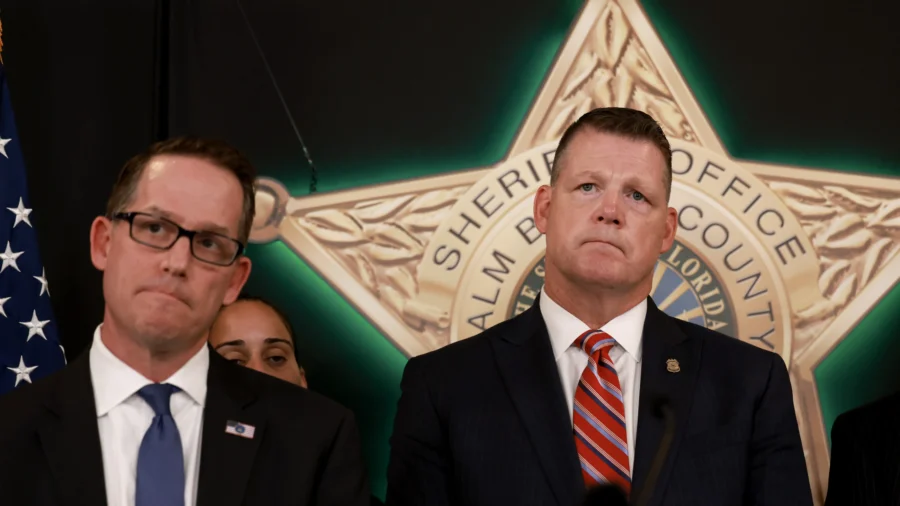Several congressional leaders have suggested that the U.S. Secret Service could receive more funding soon, following a second assassination attempt on former President Donald Trump on Sept. 15.
Trump, the Republican Party’s nominee for the 2024 presidential election, was allegedly targeted by Ryan Routh, a 58-year-old gunman with a rifle at the Trump International Golf Club in West Palm Beach, Florida—whom a Secret Service agent spotted as Trump was moving on the golf course. Routh was fired upon by the agent and escaped, though he was later apprehended, while Trump was unharmed.
Trump previously faced an assassination attempt on July 13 in Butler, Pennsylvania, where his right ear was grazed by a bullet fired by a 20-year-old gunman.
Congressional leaders of both major parties widely condemned the incident. On Sept. 16, many of them suggested that the Secret Service should receive additional funding to protect Trump, whose detail had already been increased after the July 13 incident.
“Congress has a responsibility to ensure the Secret Service and all law enforcement have the resources they need to do their jobs. So, as we continue the appropriations process, if the Secret Service is in need of more resources, we are prepared in providing it for them, possibly in the upcoming funding agreement,” remarked Senate Majority Leader Chuck Schumer (D-N.Y.) on Sept. 16, during his daily remarks.
“Today, President Trump needs the most coverage of anyone. He’s the most attacked. He’s the most threatened, even probably more than when he was in the Oval Office. So, we are demanding in the House that he have every asset available,” remarked House Speaker Mike Johnson (R-La.) in a television appearance on Sept. 16, a transcript of which his office shared with The Epoch Times.
Both houses of Congress are currently negotiating over a bill to fund the government past Sept. 30, when the 2024 fiscal year will end and regular appropriations will expire. A continuing resolution (CR) proposed by House Republicans, which would fund the government until March of 2025 and includes controversial legislation regarding election security, was rejected by Democrats. Johnson canceled a planned vote on that CR on Sept. 11 amid internal opposition.
Rank-and-file members of both Houses have also endorsed the idea of more funding for the Secret Service. On Sept. 16, Sen. Rick Scott (R-Fla.), who represents Trump’s home state, announced that he would introduce a bill to grant Trump the same level of protection as President Joe Biden and Vice President Kamala Harris, who receive mandatory Secret Service protection under federal law.
“The Secret Service must come to Congress tomorrow, tell us what resources are needed to expand the protective perimeter, & lets allocate it in a bipartisan vote the same day,” wrote Rep. Ro Khanna (D-Calif.) on X.
As a former president, Trump is legally entitled to lifetime protection from the Secret Service, though it is less comprehensive than the protection accorded to incumbent presidents.
“There is a difference between the sitting president of the United States … [he has] National Command Authority to launch a nuclear strike. There are other assets that travel with the President that the former President will not get,” testified Acting Secret Service Director Ronald Rowe at a joint hearing of the Senate Homeland Security and Judiciary committees on July 30, regarding the first assassination attempt.
During an interagency press conference on Sept. 15 about the incident, Palm Beach County Sheriff Ric Bradshaw said that Trump’s status as a former president affected the level of protection the golf course received while he was there.
“The level where he is at right now, he is not the sitting president. If he was, we would have had the entire golf course surrounded but, because he’s not, security is limited to the areas the Secret Service deems possible,” remarked Bradshaw. “I would imagine the next time [Trump] comes to the golf course, there would probably be a little more people around the perimeter,” he added.
Congress has considered increasing funding to the Secret Service as part of the 2025 fiscal year appropriations package, although it has not yet come up for a vote. In the Senate Appropriations Committee, a planned vote to advance the Homeland Security Appropriations Act for 2025, which includes Secret Service funding, was stalled in August amid disagreements on that issue.
“The Secret Service piece was the biggest unfinished piece [of the bill],” Sen. Chris Murphy (D-Conn.), the chairman of the Senate Appropriations Subcommittee on Homeland Security, told The Epoch Times on Aug. 1. “It’s obviously the most politically complicated bill [with] the Secret Service questions.”
During a press conference on Sept. 16, Rowe told reporters that the Secret Service was working with Congress to receive more funding.
“We also have the necessary need to make sure that we’re getting the personnel, and that requires us to have the funding to be able to hire more people. You can’t just give me money and say, ‘Hey, we’re going to make sure that everybody gets overtime,’” Rowe remarked. “We’re going to have some hard conversations with Congress, and we’re going to achieve that.”
“I would encourage you to think big when it comes to resourcing the department in light of what happened,” Sen. Lindsey Graham (R-S.C.) told Rowe during the July 30 hearing.
Biden also indicated that he supports more funding for the Secret Service. “The service needs more help. Congress should respond to their need,” he said.
Leaders of the Senate and House Appropriations Committees did not immediately respond to a request for comment.
From The Epoch Times

